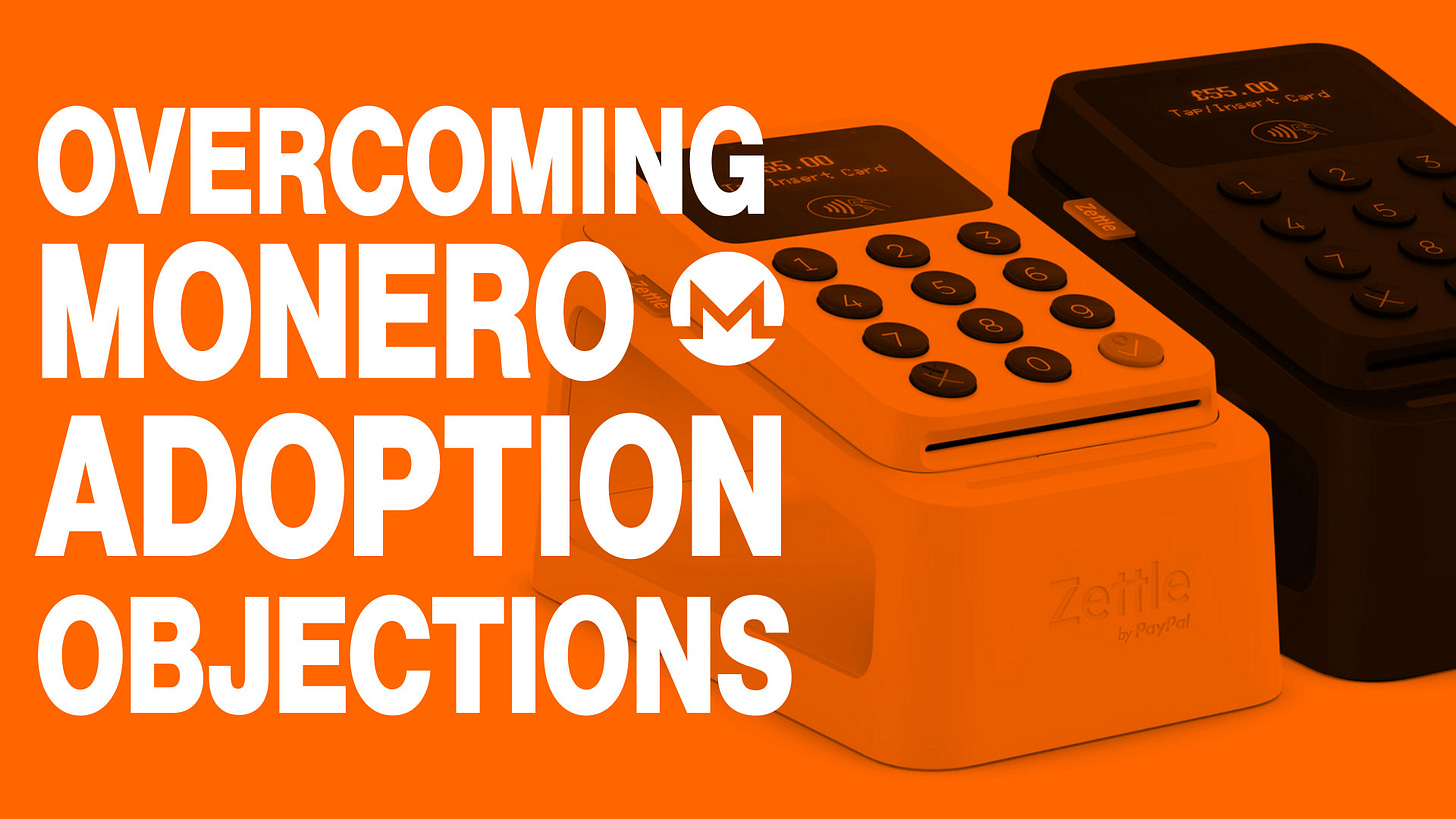Marketing Monero
Why should businesses use Monero?
If building a Monero circular economy requires the adoption and use of XMR payments from small and medium sized businesses, then potential objections must be preemptively addressed.
In this article I will be covering:
Understanding Adoption Objections
Solution Selling
Convenience
The goal of this article is to better equip you to persuade others to consider adopting Monero payments for their business.
Understanding Adoption Objections
When seeking to bring a new and untested product or service to the market, one must first put themselves into the shoes of the customer to determine objections to your offer that could arise.
By addressing these we will be better prepared to persuade others of contemplating the usefulness of our product or service, in this case Monero payment processing for business owners.
This way we can focus our attention and messaging on what really drives behaviour change.
What adoption objections could one raise when positing Monero payments to a small business?
Here are some that I assume and put forth for your consideration:
Is it legal or illegal for me to receive crypto payments?
Does it complicate my tax?
Do enough of my clients or prospective clients use crypto to make it worth my time?
Is anyone else making a living accepting crypto payments?
Will it even help my business grow?
It all sounds too complicated to me.
Since I can't understand this how can I trust you are not trying to scam me?
Do you accept Monero payments for your business? Why should I trust a hypocrite?
Private money? My business already accepts cash.
By assuming such objections, even those that are of bad faith or synical, we can start to craft a strategy that addresses concerns when communicating Monero payment adoption.
Business owners, at a basic level, seek to pay their bills and grow their business. Monero, if to be adopted, must directly meet these objectives.
Solution Selling
The most effective sales strategy is one in which your product or service solves a clearly defined problem.
This is called Solution Selling.
Further reading on solution selling: The Challenger Sale: How To Take Control of the Customer Conversation
Mitigating the above objections can be done by first framing a problem that Monero solves.
The two most pressing in the minds of people that is clearly been experienced is “shrinkflation” and the threat of programmable surveillance money, otherwise known as CBDCs.
The third ,which is more practical, is the fact that Monero transaction fees are astronomically small when compared to fiat alternatives. This fact would be particularly helpful for small businesses dealing with cash but want to start accepting digital payments.
Shrinkflation
Inflation is something everyone is beginning to notice as it is having a direct and noticeable impact on the way we receive products and services.
Our money is simply not going as far as it used to. We have to work harder and longer for the same standard of living from past generations.
This is most notably witnessed through the phenomenon known as “shrinkflation”.
Shrinkflstion is the process by which the size of shelf products shrink in quantity yet maintain the accustomed price of the item.
This technique seeks to mask the fact that customers have to pay the same for less by obfuscating the perception of pricing.
According to this article two-thirds of people in the UK have noticed products that have shrunk in size while maintaining the same price.
Inflation is the direct result of central banks issuing more currency into the economy.
The problem of inflation is mitigated by a decentralised currency with immutable rules of inflation intelligently programmed into the system.
Monero is a tool that can combat inflation and holds better value long term than that of fiat currencies.
Further reading on inflation: The Creature from Jekyll Island: A Second Look at the Federal Reserve
CBDC (Social Credit Score)
In line with Frank Herbert’s Dune science fiction series:
He who controls the spice controls the universe
Those who control a currency control the economy and all human behaviour influenced by it.
Central Bank Digital Currencies (CBDC) present the biggest threat to human dignity in recent history. The term social credit score is practically synonymous and holds popular understanding due to China's implementation of said system.
CBDCs are a means of complete financial control and surveillance that is put into the hands of a centralised body for their own personal gain.
On October 19th, 2020 Agustin Carstens, Director General of The Bank of International Settlements (BIS), said:
In cash, we don’t know, for example, who’s using a 100 bill today, we don’t know who is using a 1000 Peso bill today. A key difference with the CBDC is that the Central Bank will have absolute control on the rules and regulations that will determine the use of that expression of Central Bank liability and also, we will have the technology to enforce that
A currency that is digitally controlled and tracks all your financial activity while preventing you of accessing goods or services at the whim of an oligarchical private bank (the BIS being the central bank of central banks) is not something the world needs or wants. It is only something despots desire as a means of totalitarian dominance.
CBDCs are a looming reality that is being thrust through under the guise of other names. It is the culmination of an already scandalous financial regime that reaps where others have sown. It feeds off a society accustomed to perpetual surveillance and conditioned through digital rewards of bread and circuses.
The solution to unjust, global surveillance money is just, personal and private transactions, all of which Monero facilitates.
Contact tracing and movement restrictions connected to novel digital systems are also in the public consciousness due to the events surrounding COVID-19. It is not hard to imagine how new systems to track and surveil us could be greatly abused.
A means of private, independent transactions that can easily cross borders becomes very valuable and appealing in this context.
Further reading on CBDCs: The Final Countdown: Crypto, Gold, Silver, and the People's Last Stand Against Tyranny by Central Bank Digital Currencies (CBDCs)
Lower Transaction & Processing Fees
In business, saving money is making money. In fact, it is better than simply grossing income because tax is not collected when you save by making better purchases.
Let's assume you run a small cafe. You receive an order of coffee, tea and an assortment of treats that comes to a total of £20.
The customer wants to pay by tapping their bank card.
Below is a small list of options and the associated costs that your business would have to charge to process a payment of £20:
Sumup = 0.33p (1.69% per transaction)
Zettle By PayPal = 0.35p (1.75% per transaction)
Square = 0.35p (1.75% per transaction)
Paymentsense = 0.43p (1.9% per transaction + 5p authorisation fee)
Now let's compare the same transaction but this time the customer pays via a QR code phone payment with Monero or using HotShop:
Monero = 1p
In some cases it's literally 43 times more expensive to process the same transaction with fiat than with Monero.
Monero solves the problem of exuberant and unnecessary third party transaction fees.
More Reasons Why Businesses Should Accept Monero Payments
Convenience
Convenience is king in the realm of business.
The convenience of one-click purchases on e-commerce stores that save your payment details with next day delivery has conditioned people to expect a new standard of ease when transacting.
The convenience of cloud computing through centralised corporations via tantalising offers of “free use” at the exchange of personal and private data points has removed the notion of self-custody and the dangers of unnecessary information collection.
Further reading on monetised surveillance: The Age of Surveillance Capitalism The Fight for a Human Future at the New Frontier of Power
If Monero adoption is to be successful it must be convenient.
You must be willing to be as helpful and amicable as necessary to see your neighbour embrace better money.
The good news is that when compared to setting up a fiat bank account and transacting, Monero stands as the clear winner.
An Example - Real World Convenience
Recently I visited my in-laws in a different country and wanted to treat them to a takeaway.
The local restaurant only took cash and being in a rural location meant we had no other options to choose from. It was cash only or no takeaway tonight.
I did not carry any cash as our stay was short. The option was to drive to an ATM but this defeated the point of a home delivery and we were all tired after a long day of family activities.
Turns out my in-laws had cash in the house, so the next step was to order and then devise a way to pay them back.
They suggested Revolut, however my wife's phone, which contained the app, was not working.
International bank transfer was the next step, but the thought of exchanging these laborious details after a long day filled me with dread.
I jokingly said:
The easiest thing to do would be to send you crypto
To which my mother-in-law perked up with interest and agreed. Turns out she was fascinated by the idea or novelty of crypto and enjoyed the idea of at least holding some of it.
She handed me her phone and I got to work. I downloaded Exodus Wallet due to their great customer support should she need assistance in my absence, and created her Monero wallet (I generally would not recommend Exodus due to it being closed source software). I even wrote down her Seed phrase and explained the significance of it. I sent the Monero payment from my Cake Wallet mobile app using QR codes and, once the blockchain had finished synchronising, she had her money.
All this to say it was easier to create a brand new non-custodial wallet from scratch and receive Monero, than it was sending an international bank transfer using existing accounts which would have required special verification procedures and multiple account details.
Monero is more convenient than fiat banking in the context of account creation and international transacting.
This is something that should be leveraged.
Conclusion
When overcoming Monero adoption objections it is important to not only address a particular concern but to focus on the overall solution Monero presents to businesses that are relevant to their personal experiences and challenges.
In some instances, Monero payment processing can be 43 times cheaper than fiat. Businesses have an opportunity to increase their profits should they readily and widely accept Monero over digital fiat payments.
Many are feeling the weight of inflation and the rise of corporate and government overreach through technology. Presenting Monero as a solution in this context is a great first step in encouraging Monero adoption.
The convenience of transacting with Monero should likewise be stressed when discussed in the context of international payments.
Monero users should be as friendly and helpful as possible in order to encourage others to consider the usefulness of Monero payment processing.









